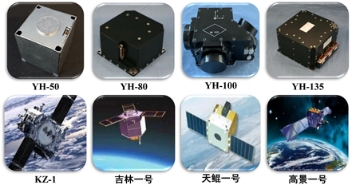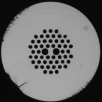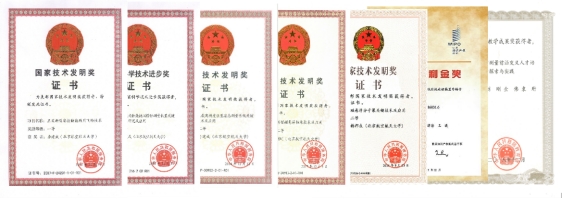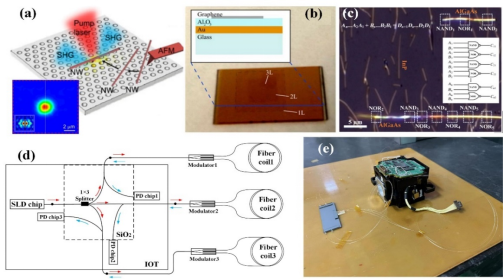Institute of Large-scale Scientific Facility and Centre for Zero Magnetic Field Science, Beihang(hereinafter referred to as “ILSF-CZMFS”)was officially established in March 2022. Its predecessor was the first domestic “Aviation Gyro and Inertial Navigation” research laboratory, established in 1956 by Mr. Lin Shi’e, the founding figure of China’s inertial technology, proposed by Mr. Tsien Hsue-shen to meet the urgent needs of “Two Bombs, One Satellite” inertial guidance. In 2003, the School of Instrumentation and Optoelectronics Engineering was established, focusing on research related to gyroscopes and inertial navigation. In 2008, under the leadership of Academician Fang Jiancheng, the institute began to carry out cutting-edge research in quantum precision measurement and sensing technologies such as atomic gyroscopes and atomic magnetometers, and the precision instruments and quantum sensing research team gradually grew, becoming one of the typical representatives of BUAA’s “four major models” (big teams, big platforms, big projects, big results). In 2019, the precision instruments and quantum sensing research team took the lead in joining the newly established Institute for Frontier Science and Technology Innovation, which was set up in response to the country’s major needs, and became its Precision Instruments and Quantum Sensing Research Institute. In March 2022, BUAA officially established the ILSF-CZMFS to promote the development and talent cultivation for the national major Science and Technology infrastructure projects led and approved under the initiative of Academician Fang Jiancheng. At the same time, the Ministry of Education has set up a special graduate enrollment quota for major national Science and Technology infrastructure at BUAA, with an additional 100 special enrollment quotas added to the existing ones each year, including 50 additional quotas each for doctoral and master’s students.
The research team of the ILSF-CZMFS is dedicated to serving the major strategic needs of the nation. Guided by the philosophy of “Harmony, Innovation, Development” and the vision of “Three Generations’ Dream of Gyroscopes,” they carry on and promote the “Eternal Spirit of the Gyroscope.” The primary discipline supported by the team, “Instrument Science and Technology,” was rated as one of the first national key disciplines in 2007, ranked first in the country in the Ministry of Education’s discipline evaluation in 2012, and was awarded an A+ in the Ministry of Education’s “Double First-Class” discipline evaluation in 2017 and 2022. Building on the strengths of existing disciplines, the institute aims at interdisciplinary integration. In 2022, on top of the existing primary discipline of Instrument Science and Technology, it added academic doctoral and master’s degree authorization points in Biomedical Engineering and Integrated Circuit Science and Engineering. Concurrently, it has authorization points for doctoral professional degrees in Electronic Information and Mechanical Engineering, as well as for master’s professional degrees in Electronic Information. This strengthens the exploration of future development directions in disciplines such as quantum precision measurement and sensing technology, represented by atomic gyroscopes, enhancing the discipline’s capacity for sustainable development and its international standing.
In addition to the Xueyuan Road and Shahe campuses in Beijing, the ILSF-CZMFS currently has two campuses in Hangzhou, located at Bin’an Road and Baima Lake, with a total of over 40,000 square meters of office and research space, providing first-class research environments and comfortable living conditions.

|

|
ILSF-CZMFS(Baima Lake Campus) |
Quantum Experiment Building(Baima Lake Campus) |

|

|
National Institute of Extremely-Weak Magnetic Field Infrastructure , Hangzhou(Bin’an Road Campus) |
International Zero Magnetic Science Valley(Under planning) |
Science Research and Postgraduate Training Base (Hangzhou)
The ILSF-CZMFS boasts a strong faculty, including a high-level “large team” led by Academician Fang Jiancheng, and has been approved for multiple national and provincial innovation teams. These include the “Navigation, Guidance, and Sensing - Advanced Inertial Instruments and Systems Technology” group by the National Natural Science Foundation, the “Advanced Inertial Instruments and Systems Technology” innovation team by the Ministry of Science and Technology, and the “New Inertial Instruments and Systems Technology” innovation team by the Ministry of Education.Currently, the Institute has 65 full-time faculty members, 117 doctoral supervisors (including 32 full-time), and 16 master’s supervisors.In addition, there are over 370 full-time research personnel at the National Institute of Extremely-Weak Magnetic Field Infrastructure , Hangzhou, one part-time doctoral supervisor from BUAA, and 84 external part-time doctoral supervisors.

Group Photo of All Teachers and Students (August 2023)
The ILSF-CZMFS possesses multiple national and provincial-level “major platforms.” Following the approval of the “Inertial Technology” National Defense Science and Technology Key Laboratory in 2010, the institute subsequently obtained approvals for two national-level research bases: the “Space Science and Technology” International Joint Research Center in 2018 and the Extremely Weak Magnetic Field National Major Science and Technology Infrastructure in 2021. It also participated in the construction of the “Quantum Information Science” Hefei National Laboratory approved in 2020. Plans for the “Quantum Precision Magnetic Field Measurement” National Key Laboratory are underway, as well as the establishment of a national major Science and Technology infrastructure for geomagnetism.
Since 2014, the following provincial and ministerial-level scientific research platforms and bases have been approved successively: the Ministry of Education “Sino-British Space Science and Technology” International Cooperative Joint Laboratory (2014), the Beijing International Science and Technology Cooperation Base for “Sino-British Quantum Sensing Technology” (2015), the Ministry of Industry and Information Technology Key Laboratory for “Quantum Sensing Technology” (2016), the Ministry of Education Key Laboratory for “Ultra-Weak Magnetic Measurement Technology” (2018), the Ministry of Education’s “Advanced Sensing and Intelligent Control” Academic Discipline Innovation (111) Intelligence Base (2020), the Zhejiang Province Engineering Center for “Precision Electromagnetic Control Technology and Equipment” (2021), and the Zhejiang Province Key Laboratory for “Ultra-Weak Magnetic Space and Applied Technology” (2022), among other provincial-level research platform bases.
In the daily management and development, these bases adhere to the philosophy of “harmony, innovation, and development” and have achieved excellent results. Among them, the Ministry of Industry and Information Technology Key Laboratory for “Quantum Sensing Technology” ranked first in the 2021 assessment of key laboratories by the Ministry of Industry and Information Technology, realizing high-level integrated development.

Extremely-Weak Magnetic Field National Major Science and Technology Infrastructure (Rendering)
In recent years, the ILSF-CZMFS has undertaken multiple “major projects.” In 2021, it was approved to construct the Extremely-Weak Magnetic Field National Major Science and Technology Infrastructure (hereinafter referred to as “the major facility”), which serves the world’s Science and Technology frontiers, national major strategic needs, national security, life sciences, and medical research, among other fields. The institute has also undertaken major national projects such as the Science and Technology Innovation 2030 Major Project, National Major Instrument Special Projects, National “973 Program” Projects, National “863 Program” Projects, National Key Research and Development Plan Projects, National Civil Aerospace Technology Special Projects, and National Natural Science Foundation Key Projects.
The research team at the ILSF-CZMFS has been persistent, hardworking, and innovative, achieving a series of “major accomplishments.” They have successfully developed experimental research equipment for ultra-high sensitivity weak magnetic field and inertial measurement with internationally leading core indicators, a prototype of a miniaturized atomic spin gyroscope, a high-precision optical gyro position and attitude measurement system, a magnetic suspension inertial stabilization platform, novel satellite attitude control energy storage dual-purpose flywheels, and large pumping speed ultra-high vacuum magnetic suspension composite molecular pumps, all of which are innovative results with international influence and core competitiveness. They have published over 600 SCI papers and have been granted more than 200 national invention patents. The team has been awarded one first prize for the State Technological Innovation Award, three second prizes, one second prize for the State Science and Technology Advancement Award, three national-level second prizes for teaching achievements, and one 19th China Patent Gold Award, among others.

Representative National-Level Awards
The research team at the ILSF-CZMFS has cultivated high-quality talents based on the discipline of Instrument Science and Technology, achieving fruitful results in talent training. The team has successively won several national-level awards for educational achievements: the Second Prize in the National Teaching Achievement Awards for Higher Education (Postgraduate) in 2018 (for the exploration and practice of the talent training model at the frontier of quantum precision measurement), the Second Prize in the National Teaching Achievement Awards for Higher Education (Undergraduate) in 2022 (for Beihang University’s exploration and practice of transforming scientific research potential into talent training energy with deep-rooted devotion and integration of science and education), and another Second Prize in the National Teaching Achievement Awards for Higher Education (Postgraduate) in 2022 (for the exploration and practice of inheriting the eternal spirit of gyroscopes and cultivating high-level innovative talents in the field of inertial technology and navigation). In July 2023, the team was named the third batch of “National Huang Danian-Style Teacher Teams.”
Since 2007, the team has achieved one National Hundred Excellent PhD Theses award, 1 nomination for the National Hundred Excellent PhD Theses, 1 Beijing Outstanding Doctoral Dissertation, 5 Excellent Doctoral Dissertations from a National First-Level Society, and 13 Outstanding Doctoral Dissertations from BUAA. Additionally, 5 graduate students have received the National Science and Technology Awards, 1 Special Prize at the first China (International) Sensor Competition, and 7 PhD students have been recognized as “Top Ten Graduate Students” at BUAA. The team has trained a group of high-level innovative and entrepreneurial talents, including Qin Jie (Deputy Director of the 33rd Research Institute of the China Aerospace Science and Industry Corporation and a group expert) and Liu Baiqi (founder and CEO of Galaxy Power (Beijing) Space Science and Technology Co., Ltd.).


Awards for Outstanding Doctoral Dissertations Awarded



